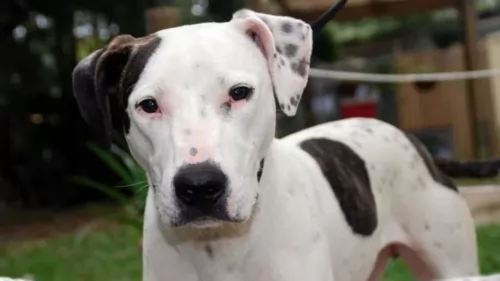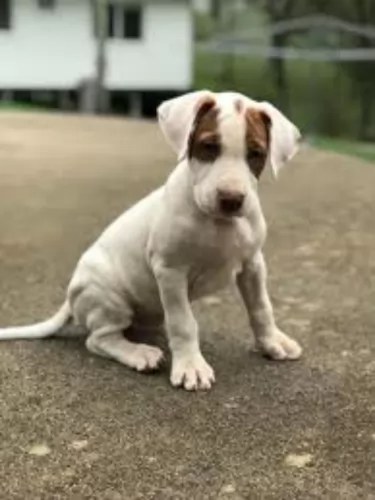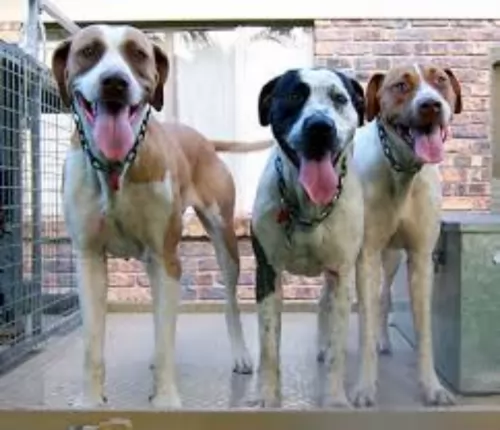 Petzlover
PetzloverBull Arab is originated from Australia but Schnauzerdor is originated from United States. Bull Arab may grow 7 cm / 3 inches higher than Schnauzerdor. Bull Arab may weigh 15 kg / 34 pounds more than Schnauzerdor. Both Bull Arab and Schnauzerdor has same life span. Both Bull Arab and Schnauzerdor has same litter size. Both Bull Arab and Schnauzerdor requires Low Maintenance.
 In the 1970’s feral pig hunters wanted a dog that could be aggressive in finding and capturing the pigs. The hunters crossed the German Shorthaired Pointer, the Bull Terrier and the Greyhound to develop the Bull Arab. It is believed that the hybrid is at least 50% Bull Terrier. It is also possible that there is some Doberman, Mastiff, Great Dane and/or Pointer in the hybrid as well.
In the 1970’s feral pig hunters wanted a dog that could be aggressive in finding and capturing the pigs. The hunters crossed the German Shorthaired Pointer, the Bull Terrier and the Greyhound to develop the Bull Arab. It is believed that the hybrid is at least 50% Bull Terrier. It is also possible that there is some Doberman, Mastiff, Great Dane and/or Pointer in the hybrid as well.
The job of the Bull Arab is to hunt out the feral pigs, grab one by the ear and hold it until the hunter arrives. They have a strong sense of smell and that is how they find the pigs.
Mike Hodgens, an Australian, developed the hybrid and added some Bloodhound as well to get that ability to smell out the pigs at great distances. They are also capable of catching buffalo and cattle. Some Australians use the breed in cattle or buffalo ranching. They are registered with the DRA or Dog Registry of America, Inc.
With these modern day mixed-breeds, there is no history or records of when they came into being so we assume the USA. And so it it with the Schnauzer Lab mix breed. Each of the parent dogs – the Schnauzer and the Labrador, have their own histories.
It is uncertain how the Schnauzerdor came into being. Not so long ago, puppies born from different parents were simply labeled mongrels, but today they have been specifically bred. With these dogs you are never really sure how the puppies will turn out, and even within one litter, the puppies can be different looking.
 Mike Hodgens succeeded in developing a powerful, well built dog. The Bull Arab has a powerful head and muzzle. He has moderate length drop ears and bright eyes that match the color of his coat. His chest is neither shallow nor deep and his back is straight and strong. Their tails are tapered and pointed yet the base is thick. They are a double-coated dog. They can be white with black, tan or liver, flecked or bicolor.
Mike Hodgens succeeded in developing a powerful, well built dog. The Bull Arab has a powerful head and muzzle. He has moderate length drop ears and bright eyes that match the color of his coat. His chest is neither shallow nor deep and his back is straight and strong. Their tails are tapered and pointed yet the base is thick. They are a double-coated dog. They can be white with black, tan or liver, flecked or bicolor.
A Schnauzer Labrador or Schnauzerdor is much the same size of the Labrador if the parents were a Labrador and a standard Schnauzer.
You can expect the height to be roughly between 50 to 62cm and weight could be anything from 20 to 35kg. Everything will depend on the size of the Schnauzer really as there are 3 kinds – miniature, standard and giant.
There’ is no way of knowing what physical characteristics the Schnauzerdor will get from each parent. The coat of these dogs can be anything from smooth to wiry and they can also be in a number of different colors, from yellow to cream, grey, black, brown.
Schnauzers and Labradors are intelligent dogs so the Schnauzerdor is guaranteed to turn out smart. Make sure that your Schnauzerdor receives training and socialization. Clever dogs like this won’t battle with training and it can ensure your pet is obedient and balanced, knowing how to behave around different people and in different situations.
Schnauzers are considered non-shedding and hypoallergenic, so it could be that your Schnauzerdor ends up with a low shedding coat.
Your dog is likely to be social, playful, energetic and a good watchdog. They are loving and loyal to their human family members.
 The Bull Arab is intelligent, calm and loyal. Like Pit Bulls in the U.S., the Bull Arab has a reputation for aggression against both people and animals. There is no data to support these claims. They have been used as therapy dogs and companion animals very successfully. They are great with kids and very affectionate. The breed is cited as being used for companion and therapy animals
The Bull Arab is intelligent, calm and loyal. Like Pit Bulls in the U.S., the Bull Arab has a reputation for aggression against both people and animals. There is no data to support these claims. They have been used as therapy dogs and companion animals very successfully. They are great with kids and very affectionate. The breed is cited as being used for companion and therapy animals
The Schnauzer Lab is a crossbreed so this essentially means that your dog can have behavioral traits from either of the parents.
They're social, friendly, loving dogs that can also make good watchdogs. The Schnauzerdor gets on well with children and can get on with other dogs too. With training and socialization he becomes much more amicable and obedient, making a super family companion.
You can be sure that he is going to make your family a great playmate, friend and pet.
Your Schnauzerdog can live to be between 10 and 14 years of age if looked after well. There are some dog illnesses that many dogs succumb to, regardless of breed or age -
Hip dysplasia is when the hip joints don’t develop properly. You notice your dog is reluctant to play and even battles to get up again after lying down. Hip dysplasia can lead to painful arthritis and you will need to get him to the vet for pain relief and a treatment plan.
This dog loves his food, and because you love him so much, it will be tempting to pop treats into his mouth all the time. It is so easy to overfeed these dogs and obesity is a big problem and can contribute to joint problems with a dog as well as strain on the heart and other organs.
 This is a working dog so he needs to eat the right kind of quality dog food. In order to avoid bloat do not feed large meals but rather feed one to two cups of food two to three times a day.
This is a working dog so he needs to eat the right kind of quality dog food. In order to avoid bloat do not feed large meals but rather feed one to two cups of food two to three times a day.
Hunting Accidents – this is the biggest reasons for health problems with the Bull Arab.
These are working dogs that are inactive when not working. They need a lot of exercise if they are not used for hunting. Agility, Tracking and hunting games, and field trials.
Check your Schnauzerdor’s ears and eyes for infection. Look inside his mouth and check for bad teeth. When you brush him twice a week, check him over for new lumps.Trim his claws.
Your Schnauzerdor is an active dog and he will require vigorous exercise every day. A daily walk won't be enough for this dog. He will want runs in the park off his leash as well as rope- and ball games.
Give your Schnauzerdor the best chance to enjoy good health by providing him with good food.
There are some good commercially manufactured dog foods out there and they can be a good, convenient choice, especially if you choose the high quality ones known for their wholesome, natural ingredients.
Give him some home-made food too which can be added into the dry kibble twice a week. Boil brown rice and chicken in a pot and add in sweet potatoes, carrots and spinach. Chop all this up and as a treat, add some of this into the dry kibble.
Your dog’s wagging tail will be all the thanks you need. Try to also include some raw meat occasionally. Never leave your pet without a constant source of fresh, cool water.